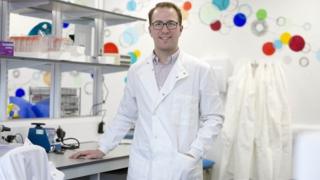 Image copyright Indoor Biotechnologies
Image copyright Indoor Biotechnologies A company in Cardiff has developed a test for coronavirus T cells – which can potentially provide longer-term immunity to the virus than antibodies.
The body develops T cells when fighting an infection and they can create more antibodies if a person is exposed again.
This means the immune system could remember how to fight Covid-19 even after original antibodies have faded.
Indoor Biotechnologies is “hopeful” the test will help in vaccine development.
It has received almost £50,000 in funding from Innovate UK, a research scheme supported by the UK Government.
The company’s trials found some people who had coronavirus but tested negative for antibodies went on to test positive for T cells – meaning more people may have some immunity than previously thought – and for longer.
It is working with Cardiff University’s School of Medicine on the test and is now approaching vaccine developers, pharmaceutical companies and public health bodies with the product.
Dr James Hindley, executive director of Indoor Biotechnologies and leading the T cell project, said: “A lot of the focus so far as been on antibodies and that’s important because they provide us some memory to our immune system, but T cells are just as important.”
He said the company had been testing hundreds of people who tested positive for coronavirus in the past – with a focus on healthcare workers – to check whether they had developed T cells.
It has also tested people who have never had coronavirus, to ensure its accuracy.
Some T cells create antibodies if a person is exposed to the virus again, while others can fight the virus directly themselves.
READ RELATED: The Surprising Drinks This Woman Had Every Day To Live Until 112
How long do T cells last?
Dr Hindley, whose PhD was in T cells, said: “They can live for a long time after the infection and give you that immune response.
“We don’t know with this virus how long they will last, but it might be for many years.
“That’s the basis of vaccination and vaccination development.
“We have found some situations where people have tested negative for antibodies and positive for T cells, but the significance of that we can only really determine with longer-term studies.”
Currently only a handful of laboratories across the world are equipped to test for T cells, and it is a “laborious” process with a lot of complex machinery, Dr Hindley said.
His test has “stripped back everything to the bare bones” so the test can be performed by any lab with a single vial of blood, with results within 24 hours.
Currently the focus of the company’s efforts are how the test can help with vaccine development, but Dr Hindley said it could eventually be rolled out to the public as a more sensitive method of testing for immunity.
“It is something the general public could find useful,” he said.
Dr Ian Campbell, executive chair at Innovate UK which is supporting the project with funding, said: “This will give clinicians an extra tool, in addition to antibody tests, as we seek to develop treatments and vaccines.”
Dr Martin Scurr, a post-doctorate researcher in Cardiff’s School of Medicine, is working with Indoor Biotechnologies on the test.
“The aim is to develop a T cell test that can be easily used by labs across the world, enabling mass testing of Covid-19 T cell immunity to be performed,” he said.
Source: BBC News – Health









